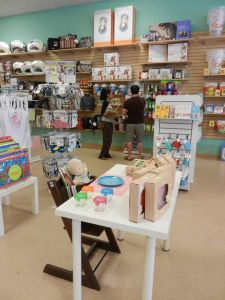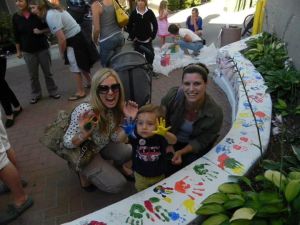 Written by guest author, Heatherleigh Navarre
Written by guest author, Heatherleigh Navarre
Owner of Boston Tea Room
Years ago, when I was a child out running errands with my father, I noticed that everyone we met knew him by name. The woman who got him his coffee at the donut shop on the corner, the man at the dry cleaner where we picked up Dad’s shirts, and even the gas station attendant who filled our tank (it was THAT long ago), all called him “Pete” and chatted amiably with him for a bit. When I asked him that day how all those people knew him so well, I got my first lesson in the importance of shopping local.
Dad explained that these were all small locally owned businesses that made it a point to get to know their customers, which meant that he always got better service there than at other places where he wasn’t known. As dad put it, “This winter if there’s a cold morning when my car won’t start, I can call Ed at the station here, and he’ll come help me out, because he knows I always fill up my tank at his place. It pays to know folks, kiddo.” It was a lesson I never forgot.

It’s more than thirty years since then, and that lesson has proven true over and over again. Now that I’m a small business owner myself, I remember that day, and I try to follow that example of getting to know everyone who visits my shop. It’s fun, because in case you haven’t noticed, people are fascinating creatures. It helps that I am an extrovert by nature, and I really do believe that everyone has a story to share. But getting to know my own patrons isn’t where it stops for me. I also strive to get to know my neighbor businesses, and lend them my support whenever possible, in order to help nurture and grow a thriving environment for my own shop.
When my not-so-local clients come in to visit, I need to be able to suggest a great lunch spot nearby, along with which restaurant has the most vegetarian options, which shop has great gifts for men, or who hosts the best happy hour in town, or nearby places that may have what they need when my place does not – and that means getting to know as many other local businesses as I can. And that’s not just good for my business; it’s good for my community, too.
Many of my customers are also my neighbors, living in the same town, and by trying to ensure that the local business community thrives, I am doing my part to co-create a vibrant place for all of us to live, work, and play. So there’s a component of good business practice, and there’s an altruistic component, as well. I want to live in a place where there is a diverse, creative, and unique vibe, where small businesses are able to succeed, and where individuality is valued and encouraged.

Of course, there’s a selfish motivation, too. The night before Thanksgiving, my staff and I were hard at work, and getting a bit ravenous. We called one of our favorite local eateries to get some food delivered, and were told that they had already closed for the holiday (darn it), but that since we were regular customers, he would make an exception and bring us whatever we needed (hooray!). I doubt any of the corporate chains would’ve been so accommodating (thank you Felix and the whole crew at M-Brew!)
Small business owners are my heroes and heroines. They are scrappy, industrious risk-takers. The owner of that donut shop I mentioned earlier gave me my very first job, and taught me the value of a good work ethic and that there is dignity in every task. “To feed people is to bless them,” he told me once.

The owner of a record store where I worked in the nineties taught me that to complain about ‘the public’ is nonsensical. People are individuals, and lumping them together robs them of their humanity, so don’t do it.” Six years ago, it was Jacki Smith and Patty Shaw, local owners of Coventry Creations, who actually invited me to open a shop here in Ferndale, right next to their business, for which I am eternally grateful.
More recently, another local business owner, Cheryl Tucker, of Rouge Makeup and Nails, sat down with me over coffee and spreadsheets and helped chart a course for making some big changes for my little shop in the New Year. We had a great time brainstorming and accomplished so much – far more than I could have done on my own.

Local businesses are always on the front lines: they are hit hardest in recessionary times, and they are the drivers of any economic recovery, not to mention being the sole economic support of so many of our friends, families, and neighbors, so when I spend my money with them, I know it’s going into the pockets of the people in my community. I learn far more from them than from any class I’ve ever taken, or business book I’ve ever read.
So, support your local small business owner. Get to know them, and your life will be better for it, and if you dare, BE one. The world needs more courageous fools living their dreams.
Heatherleigh Navarre is the owner of Boston Tea Room, a family business in downtown Ferndale. Boston Tea Room is an award-winning independent book store, gourmet tea shop, and psychic reading salon. She loves reading, road trips, and long conversations with other small business owners over piping-hot cups of tea. More information at bostontearoom.com









 n by from 10-11am on a bright blue Sunday morning. When the start of our 10:30am service came, less than half our group was present. Rather than complain, we happily went outside and started cheering the runners on with gusto, encouraging them to finish strong, waiting for the rest of our community to be released from traffic. I loved it! I was so proud of our church.
n by from 10-11am on a bright blue Sunday morning. When the start of our 10:30am service came, less than half our group was present. Rather than complain, we happily went outside and started cheering the runners on with gusto, encouraging them to finish strong, waiting for the rest of our community to be released from traffic. I loved it! I was so proud of our church.








